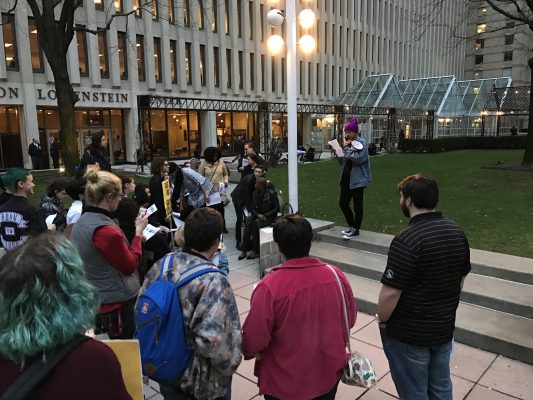Fordham Hasn’t Learned Its Lesson on Trans Rights
SOPHIE KOZUB/THE OBSERVER
Fordham students rallied for transgender rights Feb. 28 of last year, discussing topics such as gender inclusive bathroom signage.
November 16, 2018
The gloves are coming off.
The coalition of seven student organizations leading the fight for the rights of transgender and gender nonconforming (TGNC) individuals on campus has been playing nice. They’ve worked within the system, complied with university regulations and waited their turn to speak up. But that time is coming to an end.
It took years of cajoling, organizing, demonstrating and dealmaking to even take the first step of establishing all-gender restrooms on campus, but it’s no guarantee of success. The sister campaign, a student-led push for trans-inclusionary housing policy on campus, also spanned years of student activism. Working within the system, it took until spring 2018 for students to finally see the Residence Hall Association (RHA) pass a measure affirming their cause, and upon reaching the administration, it was swiftly vetoed by fiat.
Now, the coalition is moving out of the committees and boardrooms, and taking more direct action. On Oct. 25, student activist groups at Fordham sent an open letter to five top administrators calling for — if not an immediate policy shift — any acknowledgement of or commitment to Fordham’s responsibility to care equally for its students, even those whose identities are not defined by their birth certificate. With no response forthcoming, Halloween saw Lincoln Center students crowding the plaza during the Rally for Trans Rights, culminating in the hundredfold delivery of the previously ignored letter to the offices of the vice presidents of the university.
It was premeditated: the proper permits were obtained, public safety kept watch and everything proceeded in an orderly, controlled manner. The next day, Senior Vice President of Student Affairs Jeffrey Gray confirmed receipt of the letter, and promised that he and his colleagues would discuss the situation and follow up with student leaders on the issue.
Then came the silence — weeks long but still unbroken. The same silence that called for the rally in the first place. The same silence that tells TGNC students that they are unfitting and unwanted here. The same silence that speaks volumes about the contempt and lack of compassion that our administration has for some of the most vulnerable students under their care.
How brazen, how condescending, to double down on cruelty when begged for compassion? The student body has called on Fordham to do the right thing, and the administration has hung up. How can Fordham continue to call itself a Jesuit university, committed to seeking justice and the values of Cura Personalis, when its institutional stance on TGNC individuals is to deny them their full personhood? Faced with clear injustice, confronted with the harm they directly inflict, shouldn’t our leaders be the least bit bothered?
This is the situation encountered by those who seek to fight for the cause of TGNC rights on campus: an indifferent administration and a spurned movement. Trying to work within the system on these crucial issues has yielded few victories over many years, all while new generations of students continue to be adversely impacted by Fordham’s refusal to act. Throughout this campaign, coalitions of concerned students have taken to every available forum to speak to and seek change from the administration, but the stonewalling of change through official channels has forced the fight out into the open, from RHA meetings to rallies in the plaza.
It would be wise for Fordham to take this seriously, end its silence on the issue of TGNC individuals and rescind its roadblock on any work within the system, lest students seek redress by ever more proactive means. It will be a day of reckoning when students decide that making their voices heard is not enough — that they must also be listened to.














